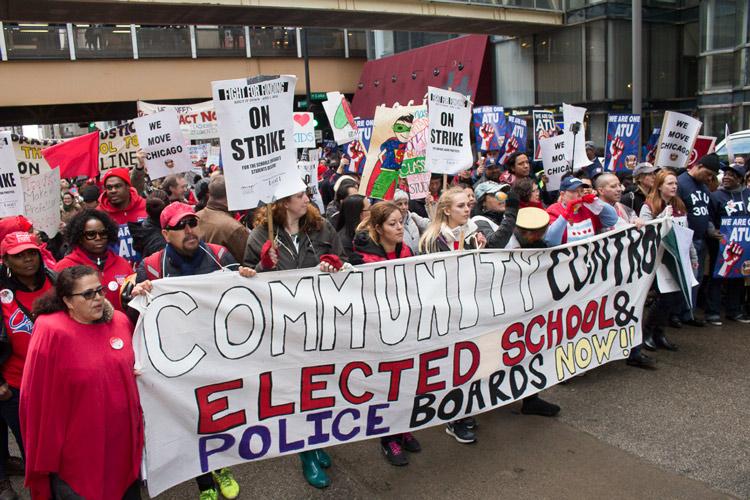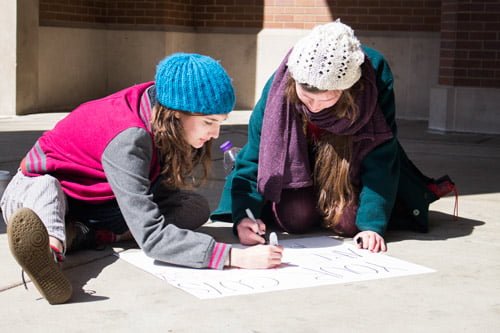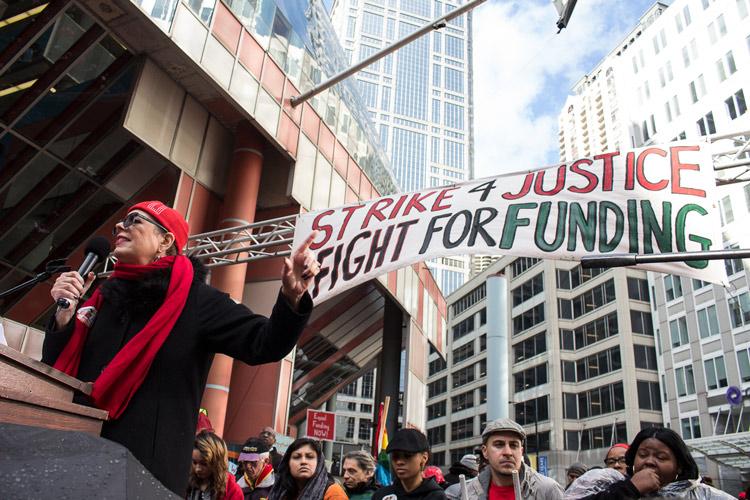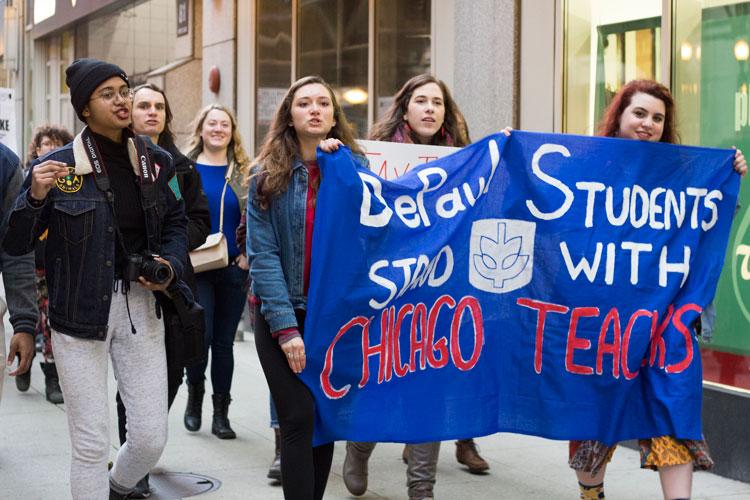
Protests in solidarity with the Chicago Teachers Union at schools across Chicago climaxed at a massive rally and march downtown on Friday, where activists preached to a red-clad legion of thousands of teachers and their allies, waving anti-Rahm and Rauner banners to the fanfare of horns, drums and cheers.
The demonstration was part of a larger effort to bring state lawmakers to fund Chicago public schools and colleges – which have had their budgets cut due to the long-running impasse in Springfield – and to persuade the Board of Education to accept the union’s terms for a new contract for teachers.

But the rally was not just for teachers; hosts of other marginalized groups were represented. Professors and their students demanded funding for MAP grants and bankrupt schools like Chicago State University. Workers from McDonald’s, nursing homes and city transportation pressed for a $15 minimum wage. And many cried out in support of the Black Lives Matter movement and African Americans who have have been shot by police officers.
DePaul students and supporters also attended the rally and march, who gathered beforehand at the Lincoln Park campus. The 40 or so students there voiced their concerns, especially about DePaul’s MAP grants that will go into limbo during the 2017-18 school year, and their support of the adjunct unionization movement. Afterwards, the group marched across campus to the chant of “Furlough Rahm, furlough Rauner, striking makes our movement stronger” and “Strikes are awesome, strikes are great, strike the rich out of our state.”
The students then joined protesters from all corners of Chicago at the Thompson Center downtown. Atop a raised platform and surrounded banners snapping in the wind stood the rally’s speakers, who voiced their messages to the crowd for over an hour as it rained lightly, occasionally broken by sweeping rays of sunlight.
“Sisters and brothers, I am so humbled to be here, and to fill the love and to fill the power,” said Karen Lewis, president of the Chicago Teachers Union. “This is what happens when we all decide to come together and to stop fighting each other, and to know who our real enemies are.”
Lewis acknowledged the rally’s relevant groups in her 10-minute speech, including teachers and professors, students of all ages and those a part of the “Fight for 15.”
“We’re not only here for the children of Chicago, we’re here for young adults of Chicago, we’re here for people who deserve and are entitled to a real future,” Lewis said to the roaring masses.
Other lesser-known activists also spoke. Veronica Morris, co-founder of Fearless Leading by the Youth, focused on police shootings.
“As important as it is to vote, as important as it is to get an education, it is equally important to organize and to do direct action, and to disobey a law that continues to violate and give an excuse for our murders,” Morris said.
Charles Preston, a senior at Chicago State University, which has had to shorten its school year because of budget cuts from the state, also spoke about issues facing the African-American community.
“I am unapologetically black, because this state has shown that they expect me to apologize for my blackness, they expect me to apologize for my existence,” Preston said. “I will continue to fight. Today, we begin revolutionary change.”
For some speakers like Lewis, the Chicago police was seen as a force to be helped, to be improved. To others, the police was a coercive arm of the state. On the nearby streets, a wall of stiff police officers stood, some faces masked, others expressing melancholy.

Jesse Jackson finished the speakers off with a short appearance, where he led the crowd in a prayer-like chant and emphasized the importance of solidarity for the marginalized.
After the rally finished, the protesters moved onto the streets and began shuffling towards the Chicago River. The march itself resembled something of a red river, swinging back and forth fluidly, signs and banners poking out of the mass. People chanted “Rahm Emanuel’s got to go. Hey hey, ho ho” and “Hey Rahm, let’s face it, your budget is racist” to the rhythm of cowbells, drums and didgeridoos as they marched.
When the protesters’ route bent, often a barrier of bicycles and horses blocked an alternative route, manned by Chicago police officers. Considering the mood held by some, most marchers were polite and considerate towards the officers. The mood could have been different at other points of the march, however.
Teachers among the throng of protesters had much to say about why they were there and if positive change in education could be obtained. Some were among the Chicago Teachers Union’s roughly 27,000 members, who teach about 330,000 students in the city, according to the Chicago Tribune.
Vanessa Zuniga, a graduate student at DePaul and a teacher of arts at Peck Elementary School, said she feels angry because she and her fellow teachers are not receiving enough funding to educate their students.

“How do you expect good results when you don’t supply us with the main necessities?” Zuniga said. “You don’t ask a metalworker to go to work without a blowtorch.”
Mary Wilson, who teaches language arts at Drake Elementary School, said she is protesting to hit Emanuel and Rauner “in the pockets.”
“You can’t get anything unless you fight for it, and I’ll fight for every child’s education no matter what color, what size, whatever it is,” she said.
Wilson also criticized charter schools for not giving their teachers the same benefits as traditional public schools. On Friday, Chicago’s 120 charter schools remained open, their 60,000 students in class. While teachers in the unions were protesting, their students had the day off.
John Finn, who is a case manager at Kilmer Elementary School and a DePaul alumnus, wasn’t sure if the march would bring adequate change. In fact, Finn said he voted against the walk out on Friday. The Chicago Teachers Union’s House of Delegates voted 486 to 124 in favor of striking on Friday.
“I was one of the two or three people that said ‘No, I don’t think this is a good idea,’ but at the same time I’m going to support my brothers and sisters in solidarity,” Finn said.
While the Chicago Teachers Union said the march was legal, Chicago Public Schools said the march was illegal because the union cannot lawfully strike until May after a 105-day fact-finding period, according to the Huffington Post.
Alan Mills, an adjutant professor of law at DePaul, was concerned about students being criminalized in prisons.
“We don’t need kids behind bars; we need kids in seats in schools,” Mills said.
DePaul students were also distressed with the state of Chicago’s education system, among them Nassir Faulkner, a senior and political science major. He said that students must come to these protests to fight for future generations.
“The more people we have, the louder our voice is, and that is what we need. We need to say this is our fight as well,” Faulkner said. “Politicians aren’t going to do it on their own.”


Hide_the_dove_bars • Apr 8, 2016 at 6:46 am
Really awesome article! I almost felt like I was there!